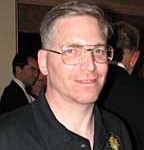
Presidential politics has dominated the news for years. Few stories are more compelling than a bare-knuckle, fight-to-the-finish political campaign. And yet, where are the SF stories that cover this?
I’m sure there are some out there, but I must have missed them. Sure, there are SF novels about presidents and other leaders, but they generally cover things that happen while they are leaders, not the titanic election campaigns that got them there. Or they cover coups or revolutions that create leaders. But what about the drama of the ballot box?
It’s sort of a puzzle to me. What has trumped (!) the U.S. news for months, and does so every four years? The race for president. It’s like the number one story everywhere, with a cast of characters – and I do mean characters! – seemingly right out of character development 101: Donald Trump, Hillary Clinton, Bernie Sanders, Ted Cruz, Ben Carson, Marco Rubio, Jeb Bush, Chris Christie, Rand Paul, Mike Huckabee, Carly Fiorina, and so on. George R.R. Martin couldn’t have done better! And we haven’t even gotten into the other cast of characters, the numerous people in conflict with these people. (Or at least with Trump.)
It has natural conflict – think of all the one-on-one battles going on this year, and the somewhat inevitable at this point battle between Hillary and Trump. Or in past years – Obama vs. Romney and McCain; Bush vs. Kerry and Gore; Clinton vs. Dole and Bush Sr.; Bush Sr. vs. Dukakis; Reagan vs. Mondale and Carter; Carter vs. Ford; Nixon vs. Humphrey; Johnson vs. Goldwater; Kennedy vs. Nixon; and Eisenhower vs. Stevenson. (And don’t forget the subplots – the primaries.) Each of these was a proverbial war between good and evil (which was which?), with huge resources on each side battling to the bitter end, with a bitterly divided audience in the hundreds of millions. Wouldn’t that be a nice audience for a novel?
My upcoming novel, “Campaign 2100: Game of Scorpions,” dramatizes and satirizes presidential politics in creating this new sub-genre, campaign science fiction. It is West Wing in the 22nd Century. The underlying theme of the novel is moderation in politics; some will read it as a Moderate Manifesto. It comes out in late January from World Weaver Press. Here’s a short description:
It is the year 2100, and the world has adopted the American two-party electoral system. The father-daughter team of Toby and Lara Platt ran the successful 2095 campaign of Corbin Dubois for president of Earth. Toby soon realizes it was a horrible mistake.
Early in the 2100 re-election campaign, an alien ambassador lands outside the United Nations, sparking a crisis. Inspired by the ambassador, Toby finally resigns from the campaign in protest of Dubois’s extreme policies. Daughter Lara takes over the campaign. Toby decides to challenge the two major parties–one conservative, one liberal–and run for president himself with a third-party moderate challenge. He vows to put his daughter out of a job.
The campaign for president of Earth takes us to every continent as father and daughter battle for electoral votes and clash over the ideas and issues facing the world of 2100.
On a side note, I’ll be away from Dec. 12-27, and then will be busy doing various holiday stuff, and so my next blog won’t be until Monday, January 4. See you all then!
2,821 total views, 1 views today